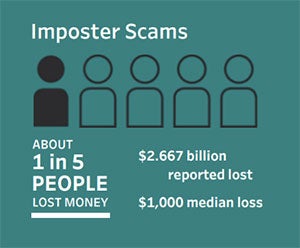The Federal Trade Commission (FTC) recently released a report of the top reported consumer frauds of 2022. The most frequently reported frauds involved imposter scams, with the vast majority of the fraudsters having contacted their victim by phone call or text message.
Imposter scams can take many forms, including posing as government agencies, well-known companies, your bank, and even a family member or friend. These scammers impersonate someone else to gain access to personal information or trick victims into making cash payments.

The FTC received reports on over 5.2 million cases of fraud in 2022, with imposter scams accounting for 20% of the total losses incurred – a whopping $2.7 billion in losses reported for this scam alone.
At the core of imposter scams is a sense of urgency and fear instilled in victims. Scammers succeed due manipulating an emotional response, leading the victim to act without thinking through the scenario.
Fraudsters use sophisticated tactics, such as spoofing caller IDs and using official email addresses, to make their scam appear more legitimate. They also target vulnerable groups, like the elderly or non-English speaking individuals, hoping they will not question their perceived authority.
These fake bank text message scams are rampant, so please be aware:
- We won’t ask you for your full debit card number
- We won’t ask to remote in to your system
- We won’t ask you to reveal your online banking details
- And finally - if you get a call, hang up and dial the number on the back of your debit card. We will always take steps to help you.
What can I do to avoid these?
Some of the precautions you can take include questioning any unsolicited call or text message, verifying the identity of the person before sharing any information, and placing a call back to a trusted phone number before making any payment arrangements.
If you have been the victim of a this or any other scam, report to the FTC at https://reportfraud.ftc.gov/. More information about this and similar scams can be found on the Citywide Banks, a division of HTLF Bank website’s Fraud Prevention section.









